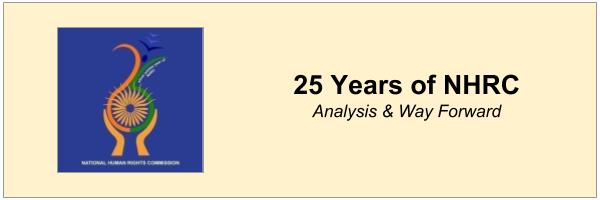25 Years of NHRC : Important Topics for UPSC Exams

25 Years of NHRC
National Human Rights Commission (NHRC) is regarded as a 'watchdog of democracy'. It was established on 12 October, 1993 under the Protection of the Human Rights (PHR) Act, 1993. The Panel constitutes five members and is headed by Chairperson who deliberates upon the cases put before them.
Programs hosted by NHRC-
1. International conclave on Human Rights
2. Panel discussion on the role of media in context of human rights.
3. Painting competition and slogans and logo-making contests.
Functioning of NHRC-
India has a constitution which fully imbibes the spirit of the Universal declaration of Human Rights, proclaimed in United Nations General Assembly (UNGA) in Paris in 1948.
NHRC either takes suo-motu cognizance of the cases through media reports or complaints filed by a victim or any other person or her/his behalf or on the basis of reports received from police department. For example, In August, 2017, based on media reports, the NHRC issued a notice to the MHA over the planned deportation of about 40,000 Rohingya immigrants.
As time passes, awareness about the NHRC's existence and work increased, so has its reached among people.
Drawbacks and Challenges-
- It is believed that NHRC is a toothless tiger with no real authority to ensure that its recommendations are implemented.
- Recommendations of the NHRC are not binding. The NHRC, however, move to Supreme Court if its recommendations are not accepted.
- NHRC also has limited powers over the defense forces. Although, NHRC has the power of a civil court, so it can conduct investigations into any allegation of human rights violations, summon any person during the course of the investigation and reach conclusion based on it. But this is not true in case of the armed forces, where on receiving a complaint or while taking suo-motu cognizance of a violation, the commission can only ask for a report from the concerned department and make recommendations based on it.
- This become major handicap for the commission in states under AFSPA-- Jammu and Kashmir and Manipur.
- Real challenge also lies the lack of awareness about the law among, particularly, the lower level of officials, who mostly deal with and have a direct interface with the public.
- A bigger issue, however, is the very nature of formation of the NHRC-- by an Act of parliament and where the chairperson and members of the commission are appointed by the President, on the recommendations of a committee that includes the PM-- which puts doubts over the independence of NHRC.
Way Forward-
- No doubt, NHRC has to face many constraints, but the provisions of the PHR Act make it an obligation on part of the Center to "provide adequate officers and staff", so that the NHRC can perform its functions efficiently.
- One of the biggest success for the NHRC in last 25 years has perhaps been its ability to raise awareness about the need for human rights protection in the country. However, before fighting for people's rights, commission may have to fight first for its own rights to protect those of other.
Multiple Choice Question-
Q. Which among the following is/are true?
1. Only a retired Chief Justice of India can become the chairperson of NHRC.
2. The chairperson can be reappointed.
a. Only 1
b. Only 2
c. Both 1 and 2
d. None
Answer a.
Hint- The chairperson is not allowed to be reappointed.
Mains-
The sample question may be-
Q. The National Human rights Commission is regarded as a watchdog of democracy. Discuss its role in protecting basic human rights along with its limitations and challenges.
Hint-- Try to start with the basic intent of HNRC and talk about UNGA in Paris in 1948. Then come directly over the positive aspects of NHRC and support the fact that it is a watchdog of democracy. The n come to its limitations and also try to include some examples like Rohingya issue and AFSPA etc. conclude with some suggestions and positive remarks.

